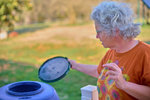

SILER CITY — Dr. John Dykers is well aware his home doesn’t pass the smell test.
As soon as you enter the front door, the odor smacks you in the sniffer — it’s unmistakable. The unpleasant stench is urine that he and his wife, Nancy Van Camp, have preserved over the past seven months.
The urine sits in several 55-gallon barrels on the Dykers’ lawn, adjacent to the house. The plan is to use that urine as fertilizer for their 100-acre farm.
The idea for using their own urine as fertilizer came when Dykers — a beloved retired Siler City physician — read a New York Times article last June entitled “Meet the Peecyclers. Their Idea to Help Farmers is No. 1.” The article shares the ancestral basis for using pee as a way to grow the garden.
“We’ve been using manure for ages,” Dykers said. “The chicken farmers used to beg us to spread the chicken manure all over these fields.”
Dykers, who has lived on his farm since 1964, said the chicken manure fertilizes fescue grass. Now, those chicken farmers can sell their manure elsewhere for profit, but the fescue grass on Dykers farm remains — that’s where the peecycle comes in.
Urine contains important nutrients for plant growth including carbon, phosphorus, potassium and nitrogen. All those nutrients are ideal for fescue grass growth.
And it’s free — something proving especially useful during time of rising inflation and ongoing supply chain issues driving up costs of commercial fertilizers. In fact, the cost of some commercial fertilizers has risen 300% in the last three years, according to the American Farmers Bureau.
By Dykers’ calculations, that makes his urine worth about $2 per gallon.
“Now every time we have to pee when we’re out somewhere else it feels like we’re literally flushing money down the toilet,” Van Camp said.
If you’re still skeptical about the practice, well, Dykers is too. He says he’s still in the testing phase because it may take several more months or even years to get enough data to measure significant results from peecycling.
But he remains optimistic because of what he’s read about in the Times and other outlets about the benefits. One study in the West African country of Niger found the use of peecycling increased crop yields by more than 30%.
The benefits are more than just personal, it’s global. As climate change creates more uncertainty for farmers, preserving urine is a sustainable, local alternative to synthetic fertilizers. According to Rich Earth Institute, which advocates for “reclaiming the nutrients from our bodies as elements in a life sustaining cycle,” the average adult produces between 100 and 150 gallons of urine per year, containing about nine pounds of nitrogen and 0.8 pounds of phosphorus. If that urine were used to fertilize grain, this is enough to grow wheat for making a loaf of bread every day of the year.
Rich Earth Institute isn’t some fringe advocacy group, either. It has academic or financial backing from the likes of the U.S. EPA, the University of Michigan and the National Science Foundation, among others. The organization boasts it’s saved more than 1.8 million gallons of water since 2013 through peecycling.
The practice of peecycling has already made headway in Vermont, where Rich Earth Institute is headquartered. There, local farmers use urine to grow everything from flowers to giant ears of corn using pee collected by interested residents. They estimate that one adult peecycler can support 1/10th of an acre food garden.
So backed by research, statistics and an experimental mind, Dykers and Van Camp are now proud peecyclers.
“You pee in a commode, but it’s just as easy to pee in a cup,” Dykers said. “That’s how we capture it.”
They each keep large plastic cups by their bedside and near the toilet for when they need to go. Those cups then get dumped in a five-gallon bucket, which they store in the shower. When the bucket fills, they dump it into the large drums outside. When those barrels are close to full, Dykers adds vinegar and acid to help neutralize the smell. It doesn’t work too well, but he says it’s better than nothing. The acid also helps make the pH of the urine more basic.
“We bought special contraptions for carrying the buckets outside,” Van Camp said. “I don’t want to throw my back out carrying this big bucket, but I especially don’t want to spill.”
Van Camp said the couple fills up the shower bucket roughly every three days.
In an early experiment, Dykers sprayed about 130 gallons of urine onto a three-acre patch to monitor the growth. He and Van Camp said there hasn’t yet been a noticeable difference yet, but that doesn’t mean they’ll stop.
Since the early experiment, Dykers said he’s evolved his technique through further research. For example, the New York Times article that first piqued his peecycle interest said the pee should sit for at least six months to pasteurize.
A University of Michigan study found aging urine makes it lethal to the worst bacteria. When urine is set to age in plastic jugs for six months or more, it becomes increasingly inhospitable to a wide range of microbes, the study found.
If his experiments prove successful, Dykers hopes this can become a model for the rest of the county. As industrial, commercial and residential developments — think Wolfspeed, VinFast and Chatham Park — take off, more and more people will be using local water sources. Dykers said preserving that water by any means necessary will be vital for ensuring environmental sustainability moving forward.
It’s no secret that wastewater treatment facilities, particularly in Chatham County, are overburdened; growth coming to the county threatens to worsen that issue. While peecycling is far from a full solution to the problem, Dykers believes it may alleviate some of the impending water issues.
When the couple tell their friends and neighbors what they’re up to, they often get brushed aside and laughed at.
“As we get more and more desperate,” Van Camp said, “I hope people start to say, ‘If my pee can be useful then let’s do it.’”
Reporter Ben Rappaport can be reached at brappaport@chathamnr.com or on Twitter @b_rappaport